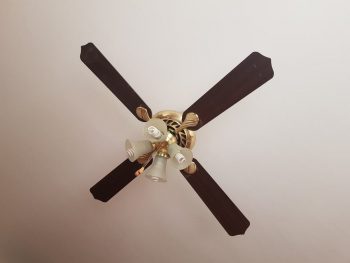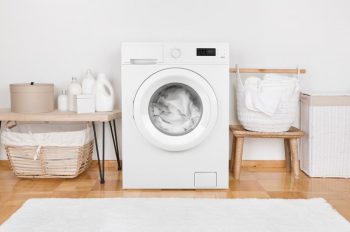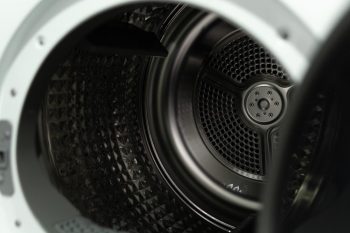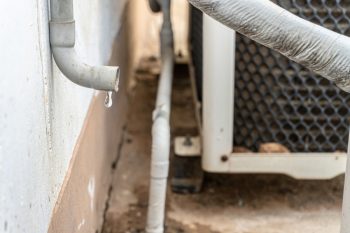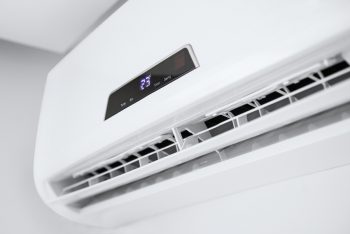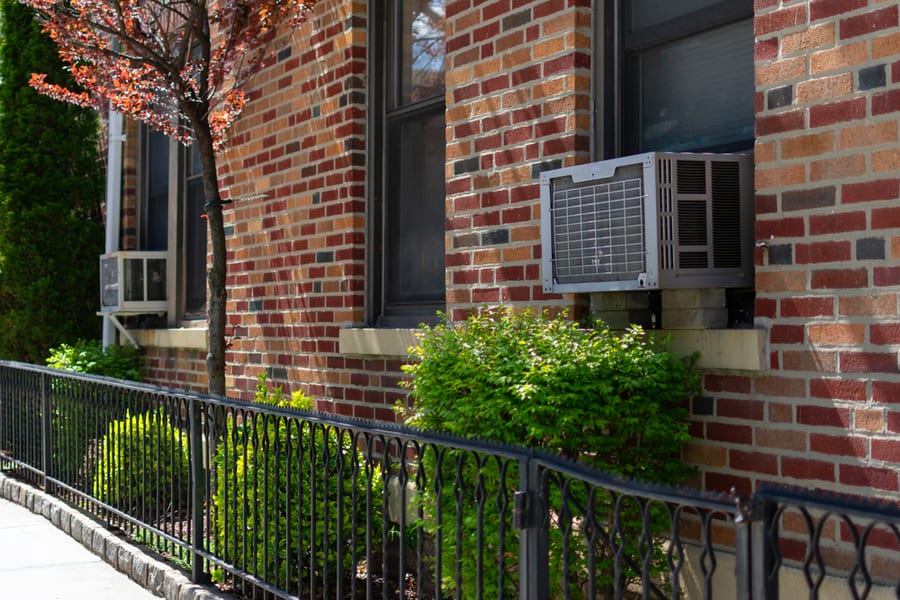
Have you ever come home to see water dripping from your window air conditioning (AC) unit? You know how frustrating it can be.
Not only can a leak be a nuisance, but it can also cause damage to your home and lead to costly repairs. So, why is your window AC leaking water, and what can you do about it?
To understand why your window AC is leaking water, it’s important to know how the AC units work.
A window AC unit uses a series of components to cool the air in your home.
The evaporator coil absorbs heat from the outer air, and the compressor pumps the refrigerant through the condenser coil, releasing heat and condensing into a liquid. The condensed water is collected in the condensate pan and drained away through the drain line.
If any of the mentioned components of your AC unit are damaged or not functioning correctly, it can cause the AC unit to leak water.
Window AC units are designed to keep your home cool and comfortable, but they can be frustrating and potentially damaging when they leak water.
Here are the top 4 causes of window AC leaks:
- Clogged drain line
- Damaged condensate pan
- Worn seals around the unit
- Broken condensate
This article will explore the potential causes of a window AC leak and provide tips to help you identify and fix the problem.
4 Causes of Window AC Leaks
There are several reasons why a window AC might leak water, and understanding these causes can help you fix the problem and prevent future leaks.
Here are the top 4 causes of window AC leaks:
1. Clogged Drain Line
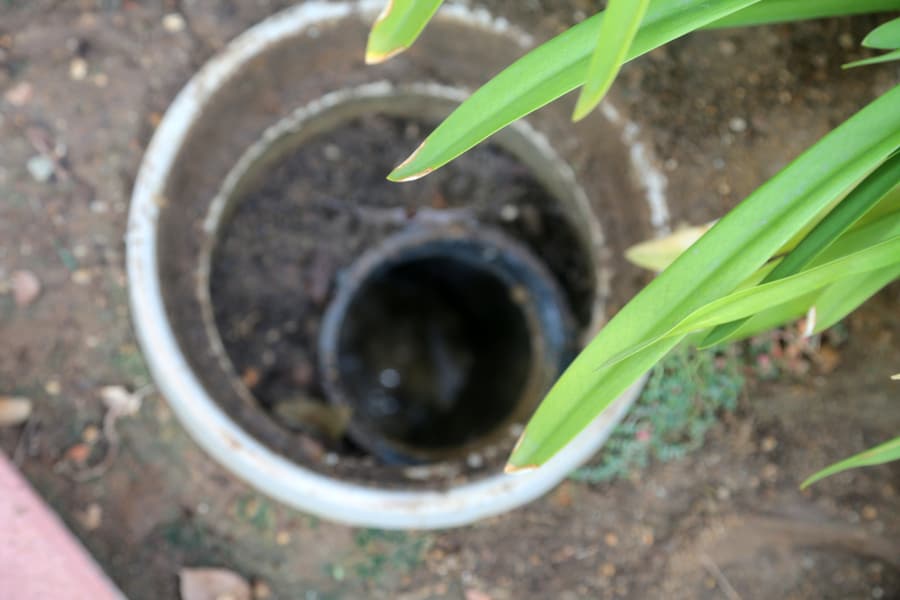
In your AC, there is a small pipe whose primary role is to carry excess condensation (in the form of water and debris) away from the unit. This pipe is called the drain line or condensate drain.
So, during draining, dirt, dust, and other debris can accumulate on the drain line. And this causes water a backup of water in the system; hence a clog forms on the condensate drain.
When this happens, the water won’t be able to flow from the drain pan. This causes the water to back up and spill over, which, in turn, causes damage to your walls and floors. It can also cause corrosion to your AC units.
Moreover, if the moisture is not cleaned after some time, the condition can be worsened due to the growth of mold and other fungal organisms on the spot. In some cases, it can lead to the total collapse of your AC system.
How Do You Know if Your AC Drain Line Is Clogged?
There are some ways to know if your AC drain line is clogged. If you have a newer model of the HVAC system, it may either automatically shut off or give you a signal when it detects that your AC line is clogged.
However, if your AC unit is an older model or the sensor is not available in your AC system, look for these signs to know if the drain line is clogged:
- AC not blowing cold air
- Vents producing bad odor
- Corrosion of the AC unit
- Water overflow from the pan
- Water accumulates in the condensate pan.
2. Malfunctioning or Frozen Evaporator Coil
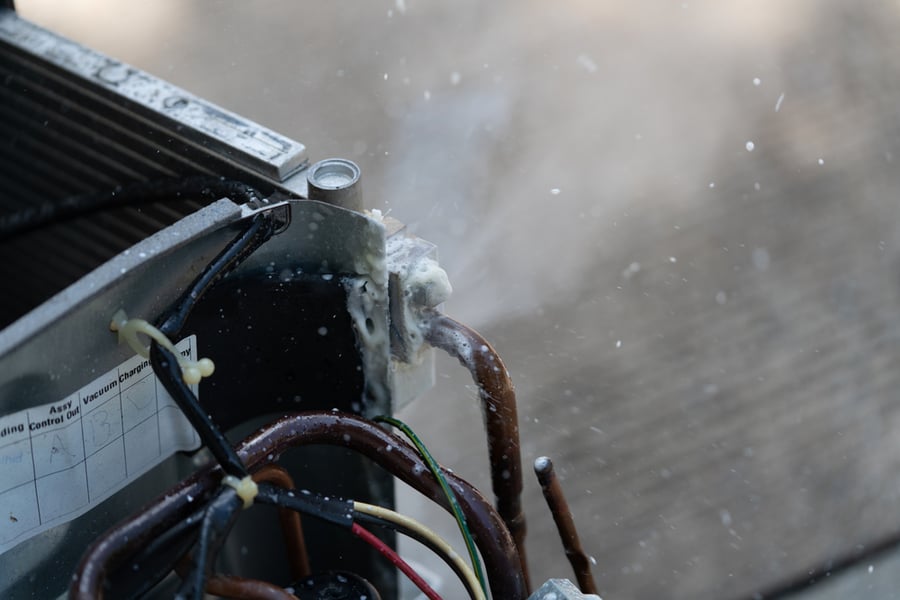
This is another major cause of the window AC leaks. The evaporator coil of an AC is responsible for cooling the refrigerant to absorb heat. The evaporator coil works together with the condenser to produce cold air.
In a properly working AC system, the evaporator coil should never freeze; it can only be cold. Under normal conditions, the evaporator works at an optimal temperature of 40 degrees to distribute the refrigerant.
At this temperature, the heat from the air can only move through the evaporator but is not cold enough to form ice within the coil.
In a condition where the evaporator coil becomes damaged and freezes, ice forms on the vent, so refrigerant won’t move effectively.
When the evaporator coil melts to liquid, the condensate can become more excessive than the condensate pan can handle. This causes the pan to overflow.
Why Does Evaporator Coil Freeze?
Your AC evaporator coil can freeze majorly because of two reasons:
- Low refrigerant: This makes the air in the AC system colder than it should be. Hence ice forms.
- Dirty air filters: This stops the air from flowing to the evaporator coil, which reduces the coil’s temperature until it freezes).
- The low temperature of outside air: As explained, the coil is responsible for absorbing heat from the air. So, the absence of such heat in the outer air can condense the coil. Hence, it freezes over.
3. Wrong Installation of the AC System
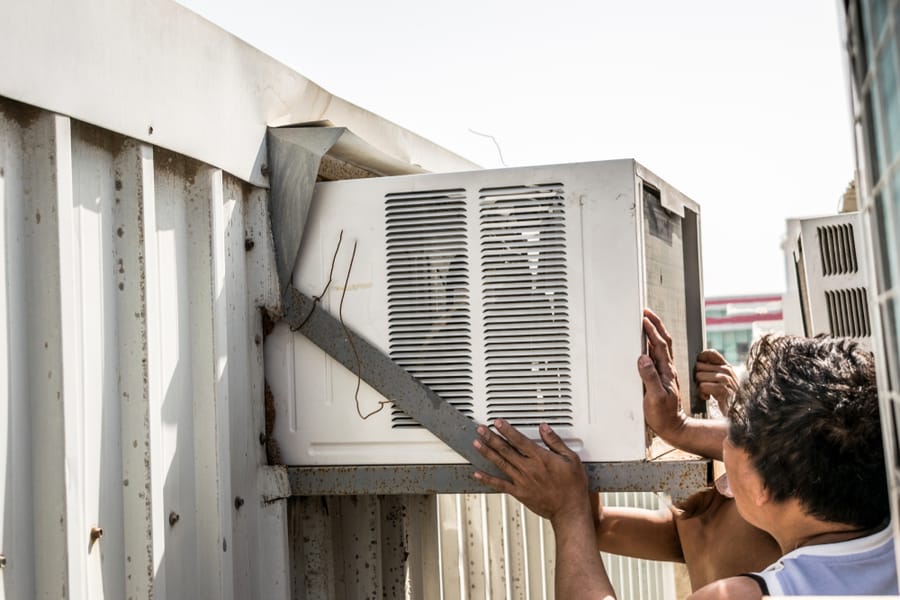
If you have just gotten your window AC recently, and water leaks out of it, this is probably the problem. It’s most likely that your AC system is installed incorrectly or the size of the AC does not fit your home (either too big or too small).
If the condensate pan of your AC unit is poorly fixed, instead of your AC to be draining outside, it’ll drain indoors.
Apart from water leaks, the wrong installation of your window AC can lead to several problems. This can occur for various reasons, including damage to the AC unit during installation, improper sealing, or incorrect placement of the AC unit.
Damage to the Unit During Installation
Damage to your window AC unit during installation can cause water leaks. This can occur if the unit is dropped or handled roughly during installation, which then causes damage to the internal components of the unit.
This damage can lead to water leakage over time, as the damaged components of your AC may not hold the water within the unit. Hence water starts leaking out.
Improper Sealing of the Unit
Another common cause of water leaks in window air conditioning units is improper sealing. When installing your window air conditioning unit, you must ensure that the unit is sealed correctly to the window frame.
If your AC unit is not correctly sealed, moisture can enter it and cause a leak. Factors such as faulty sealing materials or improper installation techniques can cause this.
Incorrect Placement of the Unit
Another common cause of water leaks in your window air conditioning units is the incorrect placement of the unit. If the unit is not accurately aligned with the window frame, it can cause the unit to tilt or lean, which eventually leads to water leakage.
This can also be a result of different factors like improper measurements or the use of incorrect mounting hardware.
Overall, it is essential to take care when installing a window AC unit to avoid problems such as water leaks.
Proper sealing, correct placement, and careful handling during installation can help to prevent these issues and ensure that your unit operates appropriately and effectively.
4. Broken Condensate Pan
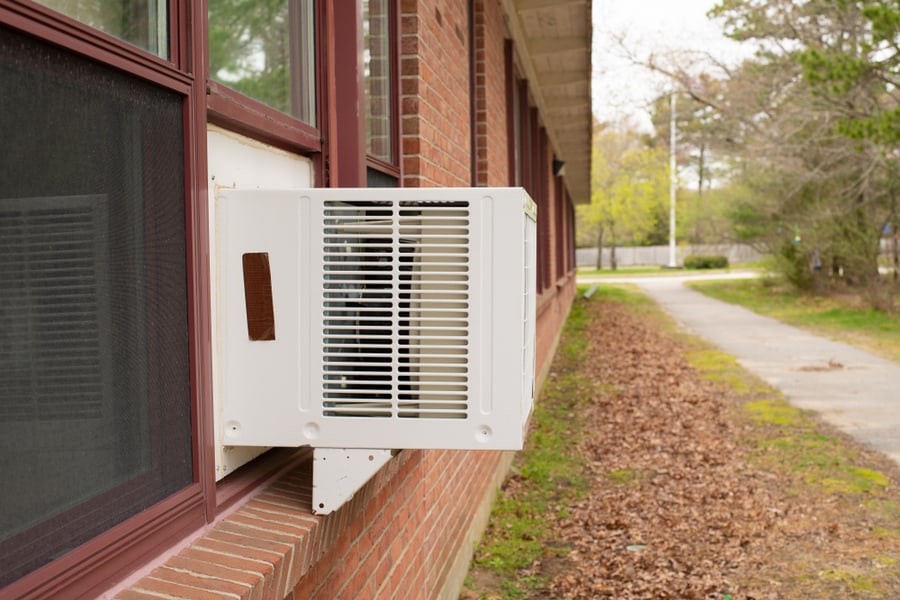
As explained earlier, the condensate pan is a component of your air conditioning (AC) system responsible for collecting and draining away the condensed water that forms during the cooling process.
The condensate pan of your AC unit is usually located under the indoor air handler unit. It is connected to a drain line that carries the condensation away from the air handler and out of the building.
When the condensate pan of your AC becomes damaged or broken, it can cause a water leak in the system.
The condensate pan of your air conditioner can become damaged due to the following reasons:
- Corrosion: The condensate pan is made of metal and is exposed to moisture regularly. Over time, this can cause rust, which can weaken the pan and cause it to become damaged or break.
- Physical damage: Some of your physical activities, like striking heavy objects on the condensate pan, can cause damage to it. It can even be that the pan is being crushed by furniture.
- Poor maintenance: If you do not regularly maintain your AC systemin, the condensate pan and drain line can become clogged, leading to water backing up and overflowing the pan.
- Age: Over time, the condensate pan of your HVAC unit can become worn or corroded, weakening the material and making it more prone to developing leaks.
- Overloading: The condensate pan can become damaged if the condensate pan becomes overloaded with water. This usually happens if your AC system is not sized correctly for the space it is cooling or if there is a blockage in the drain line that prevents the water from draining away.
If you suspect a broken or damaged condensate pan is causing a water leak in your AC system, you must have it repaired or replaced as soon as possible.
Ignoring the issue can lead to further damage to the AC system and potentially costly repairs. It is also a good idea to have your AC system inspected and regularly maintained to prevent such issues from occurring in the first place.
How To Fix a Window AC Leak
A window AC leak can be a frustrating and potentially costly problem. Water leaking from your window AC UNIT can damage your home and lead to expensive repairs if not addressed promptly.
In this section, we will walk you through the steps for fixing a window AC leak and preventing future leaks from occurring.
Following these steps, you can keep your AC unit running smoothly and protect your home from water damage:
1. Locate the Source of the Leak
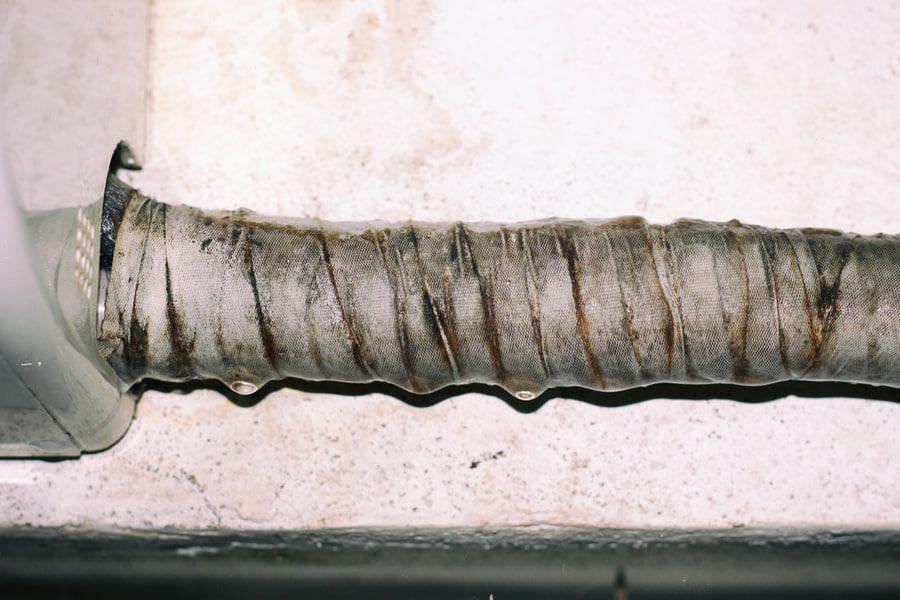
The first step in fixing your window AC leak is to determine where the leak is coming from. Look for every visible sign of water damage or dripping water around the AC unit.
You should check the condensate pan, evaporator coil, or drain line for blockages or damage. However, before locating the problem, ensure you turn off the AC system to prevent injuries while working on it.
2. Clean the AC
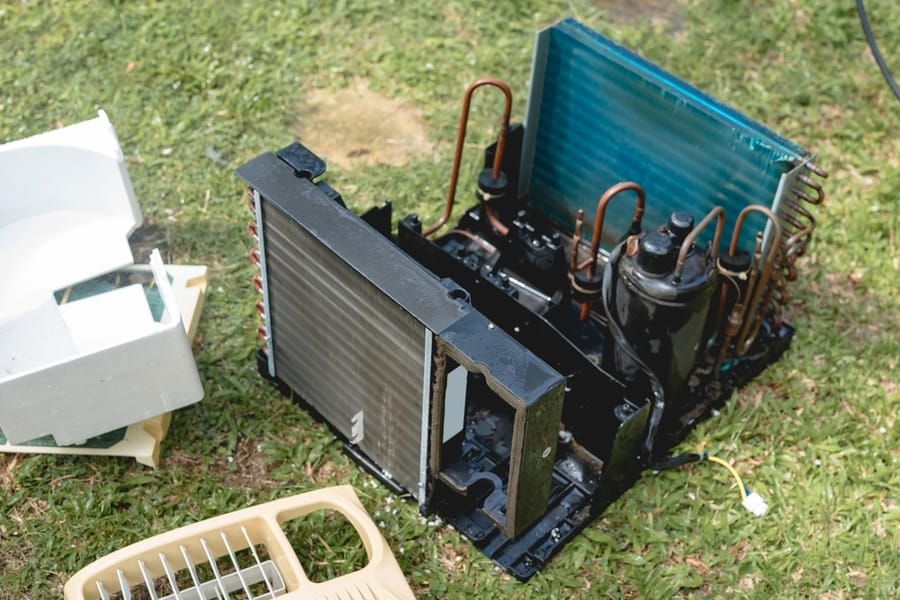
Once you have located the source of the leak, it is crucial to clean the AC unit thoroughly. Use a soft cloth or brush to remove any dirt or debris blocking the drain line or causing the leak.
In the case of a clogged drain line, after you remove the debris, make sure you use a small amount of water to flush the drain line. This will help remove any remaining blockages and ensure a clear drain line.
You may need to let a frozen evaporator coil melt naturally before cleaning it.
3. Repair Any Damaged/ Broken Part
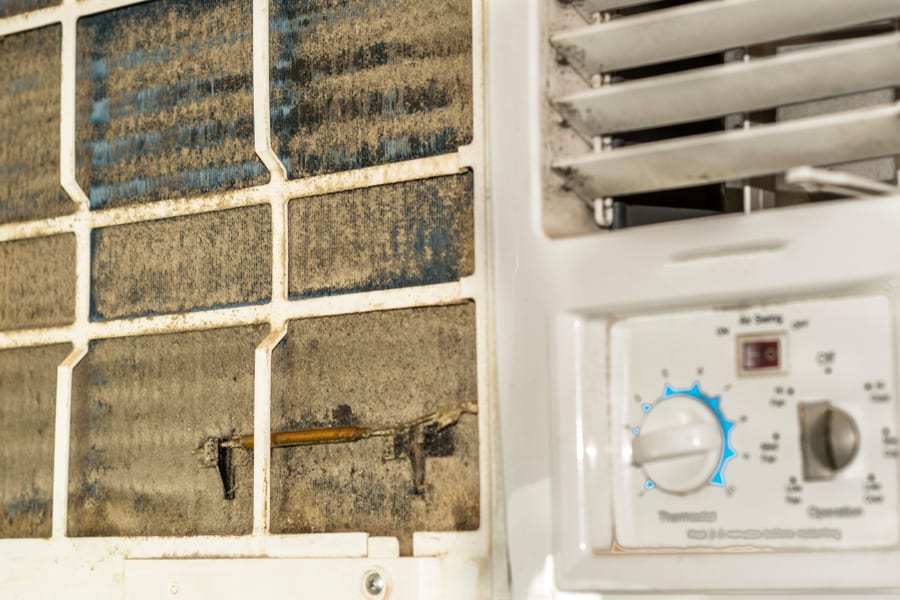
If you find any damage to the drain line, the condensate pan, or any other component, you will need to repair them.
You may be able to use silicone sealant or a patch kit to repair small holes or cracks, or you may need to replace the damaged component entirely, especially if it’s corrupted.
4. Check the Seal
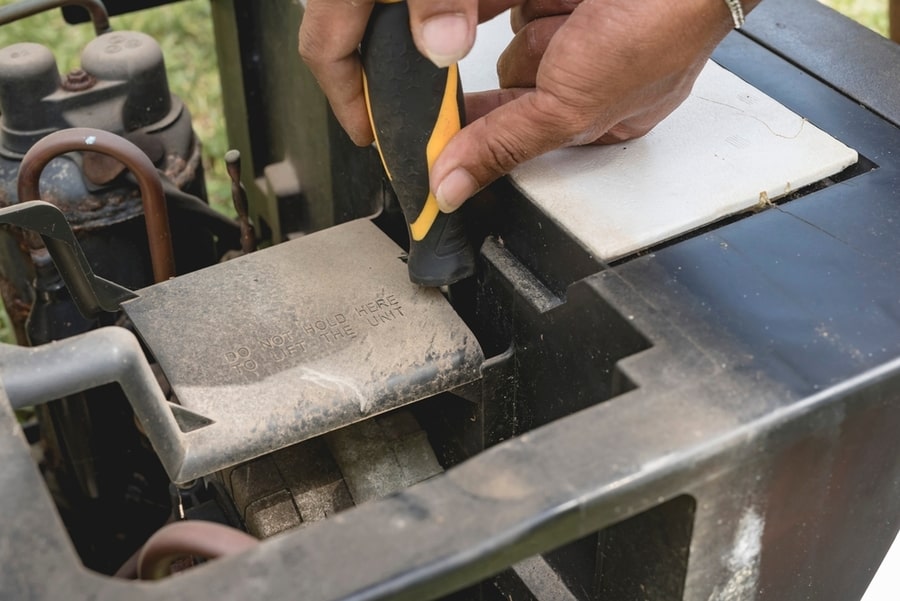
As we discussed, the seals around your window AC unit can also be a source of leaks. Check the seals for any signs of wear or damage, and replace them if necessary.
5. Check and Tighten Loose Parts

Tighten any loose bolts or screws. If you find any loose bolts or screws, use a wrench or screwdriver to tighten them. This can help prevent leaks and improve the overall performance of the unit.
6. Test the AC System
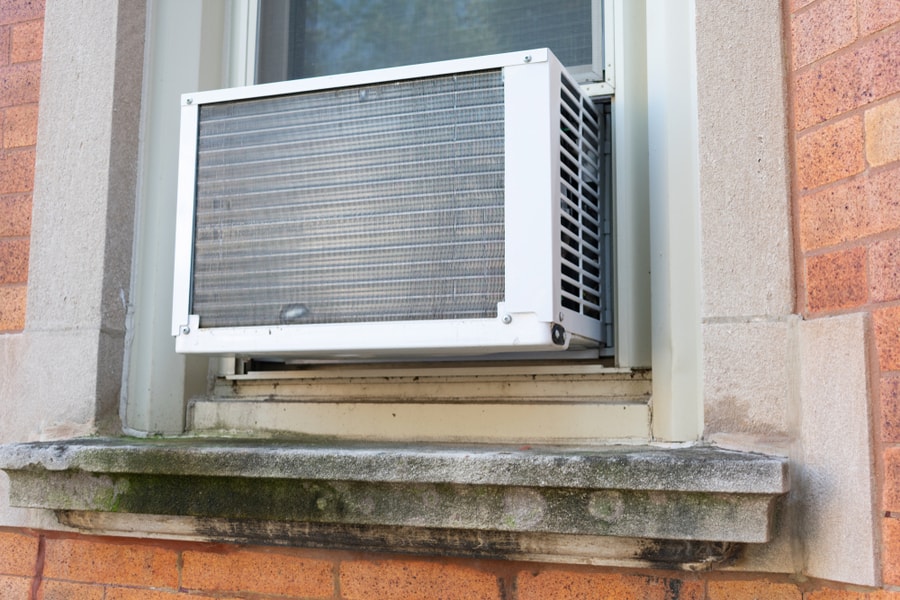
Once you have repaired any damage and replaced any worn or damaged seals, you should test the unit to ensure that the leak has been fixed. Turn the AC unit on and let it run to see if any water leaks.
If the leak persists, you may need to call a professional AC repair to help fix the problem.
Conclusion
If your window AC unit is leaking water, it is essential to identify the root cause and take action to fix it. There are several potential causes of a leaking window AC. This include:
- Clogged air filter
- Blocked drain line
- Faulty seal
- Broken condensate
To prevent your window AC unit from leaking, follow these steps:
- Regularly clean or replace the air filter.
- Clear any debris from the drain line.
- Check for any damage to the seal around the unit.
Remember that it’s always best to consult a professional for repair or maintenance.
By following these tips, you can keep your window AC unit in good working order and prevent leaks from happening.
Remember, a little preventative maintenance can go a long way in ensuring the longevity and efficiency of your window AC. Don’t let a leaky window AC unit ruin your summer – take control and fix the problem before it worsens!
Frequently Asked Questions
Can a Leaking Window AC Unit Cause Damage to My Home?
A leaking window AC unit can cause damage to your home if the problem is not addressed on time.
Water leaking from your AC unit can seep into your home’s walls, floors, and other structures, leading to rot or damage.
It would help if you fixed a leaking window AC unit as soon as possible to prevent further damage to your home.
Can a Leaking Window AC Unit Be Repaired, or Do I Need To Replace It?
In some cases, you can repair a leaking window AC system, depending on how severe the issue is and how old your unit is.
If the leak is caused by a simple problem like a clogged drain line, it may be relatively easy to fix. However, if your window AC unit is old or experiencing multiple problems, replacing it may be more cost-effective.
Do I Need To Call a Professional Anytime There’s a Leak?
You can fix simple issues with a leaking window AC unit, such as a clogged air filter or a blocked drain line.
However, if the problem is more complex or you are not comfortable attempting the repair yourself, it is best to seek the assistance of a professional AC technician.
What Happens if You Don’t Drain Water From AC?
If you don’t drain water from your AC can cause different problems.
First, the water that accumulates in your AC unit can lead to the development of mold and bacteria, which can be harmful to your health.
In addition, the excess water can cause the unit to rust leading to costly repairs or even the need to replace the unit.
Furthermore, if you do not drain the water properly, it can cause the AC to work less efficiently. This can result in higher energy bills, as the unit will have to work harder to cool your home.
To avoid these problems, you must regularly drain the water from your AC unit. This can usually be done by attaching a hose to the drain port and directing the water outside.
If you are uncomfortable doing this yourself, you can hire a professional to help handle it.

